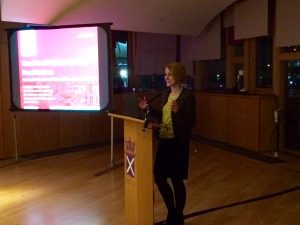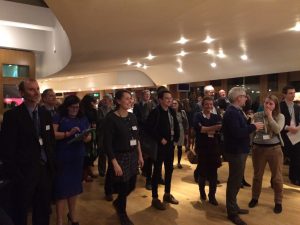Scotland is currently uniquely placed in the UK, and among only a handful of countries across the world, in developing new legislation for the food system. In September 2016 the Scottish National Party announced the Good Food Nation Bill in their programme for Government.
On Wednesday 11th January, Nourish as part of the Scottish Food Coalition, kicked off a new event series, which will be looking at the opportunity of the Good Food Nation bill to transform Scotland’s food system. From January – June 2017, we’ll explore some of the key issues related to the food system, such as climate change and biodiversity, social justice, public health, worker rights, community empowerment and the future of farming.
To start it all off, Professor Corinna Hawkes, Director of the Centre for Food Policy at City University, London, presented a broad overview of the potential of legislation to make a difference, and put Scotland’s Good Food Nation bill in a global context.


Corinna reminded audiences at the Scottish Parliament and the University of Edinburgh that food is key to delivering all of the Sustainable Development Goals. She was passionate that although food is currently at the heart of some of the world’s major problems – from climate change to social justice, public health to sustainable resource use – it also offers ways to resolve these issues. In fact, already a multitude of solutions are being proposed and implemented by countries, cities, companies and communities all over the world.
To name but a few, France has just implemented a new law against food waste; Chile has introduced a raft of policy measures to promote healthy diets; Amsterdam have bucked the trend of increasing child obesity and reported a reduction of 10% in obesity rates following the introduction of their city food strategy. In Nairobi, the promotion of urban agriculture is providing local food security and youth employment opportunities. In São Paulo 30% of school meals are sourced from local family farms, supporting the livelihoods of farmers and ensuring the freshness and quality of the food. In New York City there are statutory reporting requirements on food initiatives, ensuring action is effective and facilitating transparency and participation.
As well as the many examples of governments and local authorities taking action, there are countless initiatives from businesses and civil society also aiming to improve health, fairness and sustainability in our food system. What is lacking, Corinna argued, is coherence. If we recognise that there is a food system, then initiatives would be stronger if they were delivered in an integrated way. Corinna developed this point by presenting a number of conflicting interests relating to food.
For example, in order to reduce poverty and generate incomes to contribute to people’s food security the World Bank invests in palm oil production. At the same time the World Health Organisation aims to create health-promoting environments and reduce saturated fatty acids in foods. These conflicting objectives, and the actions that follow them, were formulated in different spaces. For policies to work coherently, rather than against each other, we need to prioritise connection and coordination across different departments.
Professor Hawkes went on to argue that in addition to improving coherence (both between food policies and along the food supply chain), a lot of work is needed to involve the people who are affected by the problems in the development of solutions. This includes involving people in defining the problem, and listening to why choices are being made. Professor Hawkes was emphatic ‘we must treat people as if they have agency’. She described an example from her work in Mexico, where some people were choosing fizzy drinks because they didn’t trust the drinking water. A sugary drinks tax, therefore, is only part of the solution, what is needed is investment in clean drinking water. Funds raised from Mexico’s sugary drinks tax are now providing water fountains in schools.
Professor Hawkes concluded that what was missing was statutory frameworks which:
- Set out a clear set of goals for ‘Good Food Nations’ with reporting requirements
- Bring together and link existing food-related policies to create coherence
- Prioritise flagship initiatives that connect supply chains for economic, social, health and environmental goals
- Require governance to create horizontal and vertical connections in government and with people.
 Richard Lochhead MSP, former Cabinet Secretary for Rural Affairs and the Environment (pictured left with Professor Hawkes) reflected that she had left the Holyrood audience, which included MSPs and civil servants, with a lot of inspiration.
Richard Lochhead MSP, former Cabinet Secretary for Rural Affairs and the Environment (pictured left with Professor Hawkes) reflected that she had left the Holyrood audience, which included MSPs and civil servants, with a lot of inspiration.
Professor Hawkes’s presentation slides are available to download here. A recording of the presentation Professor Hawkes gave at the University of Edinburgh will be available on the Scottish Food Coalition website next week. This is also the place to go for news on the upcoming events.
For more information please contact bella@nourishscotland.org.uk